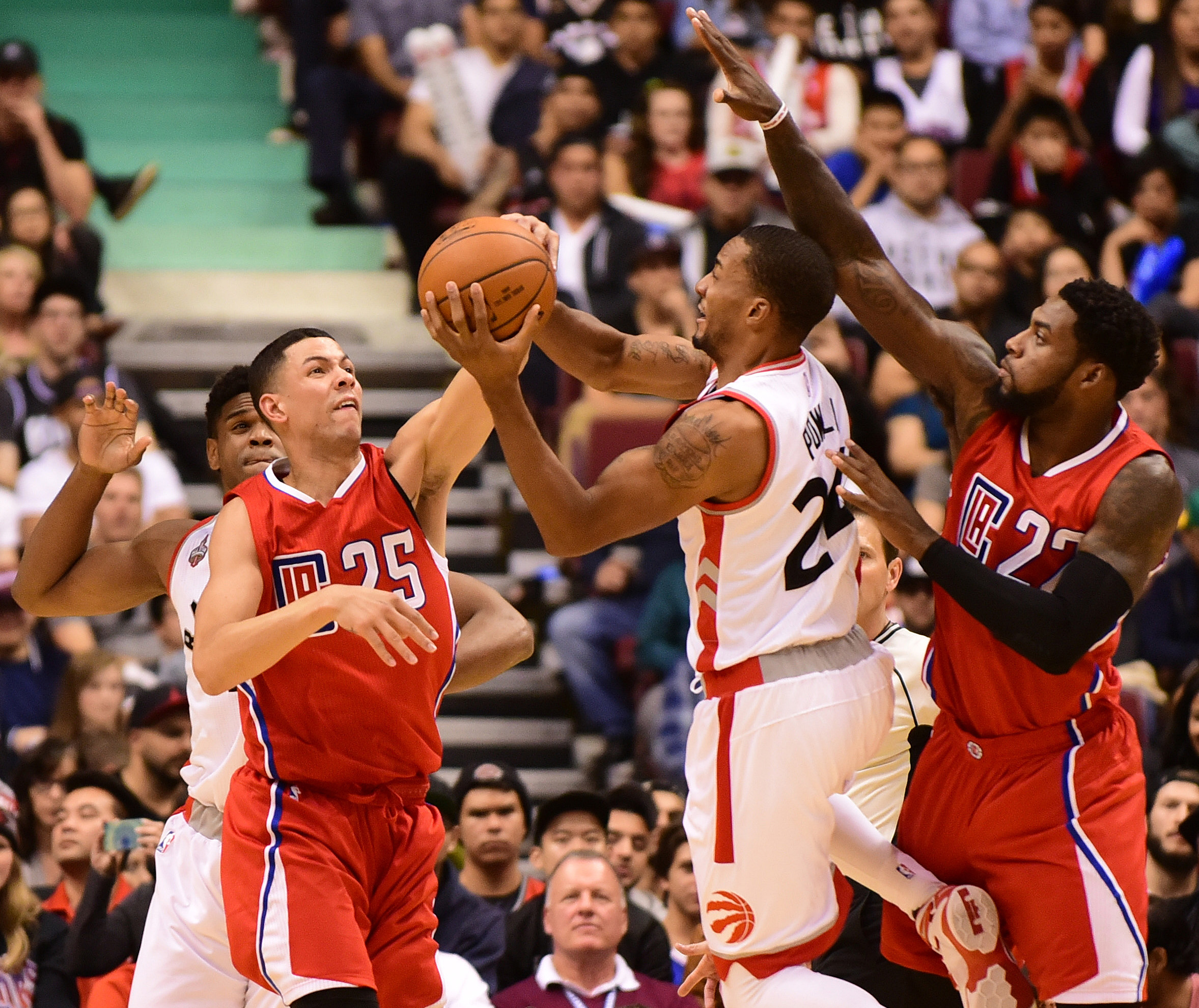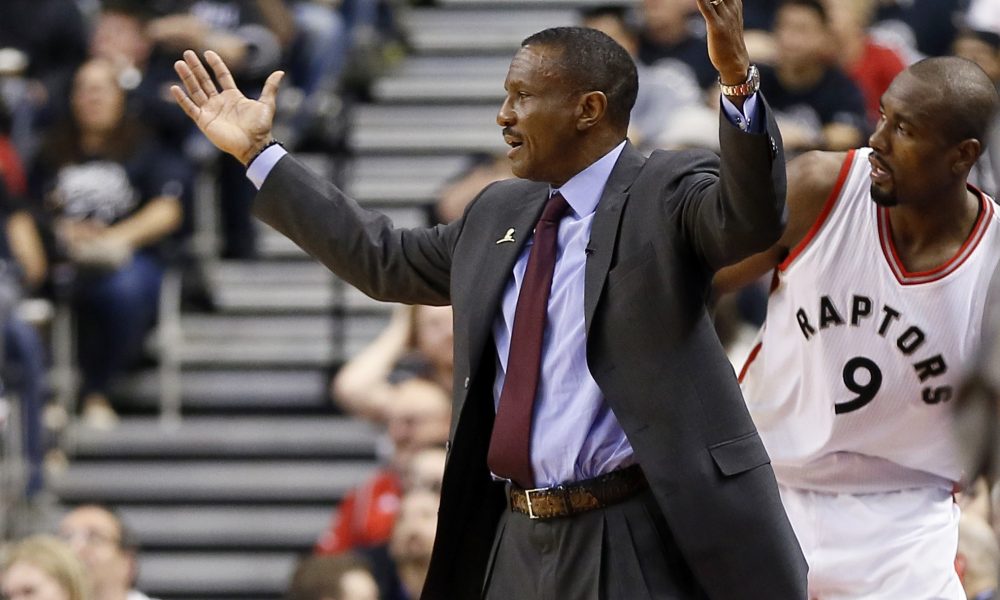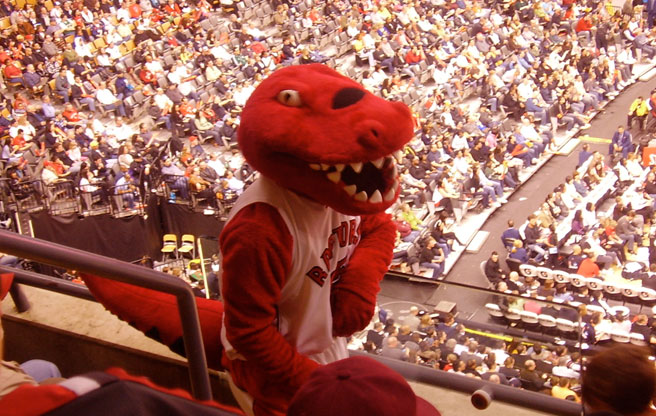You can keep up with all of our player reviews here.
This was supposed to be Norman Powell’s year.
It was supposed to be his opportunity, earned over the past two seasons by way of coming through emphatically and unexpectedly, over-delivering on his draft status as a second-round pick, swinging playoff series in consecutive years, and making DeMarre Carroll seem superfluous enough to be the chosen cost-cutting measure, even at the cost of two draft picks. Before the season, the Toronto Raptors planted their flag further in the stock of Powell, signing him to a four-year, $42-million extension that will kick in on July 1, a reward for the hard, culture-establishing work he’d put in as the team’s latest resident grinder and undervalued asset made good. Around the same time, they anointed him a starter, a job he’d been pushing for and occasionally filling in on for the past two seasons. This was it, the work rewarded financially and in responsibility, the grind finally understood and realized.
Things did not go as they were supposed to. Powell struggled out of the gate, was sent to the shelf with a hip injury, and was supplanted in the starting lineup by rookie OG Anunoby, who never relinquished the role and likely never will. Most notably, his extension – entirely reasonable at the time and seemed to have limited downside for a young two-way wing with playmaking ability – now looks like a minor albatross the Raptors will have to try to unload this summer. If they don’t, they run the risk of losing Fred VanVleet in restricted free agency or being stuck with an exorbitant luxury tax bill for a team that tops out as finals fodder, all to keep a player who pencils in as the team’s 11th man once again, should nobody else be unloaded. The extension still seems a fair enough bet, given that Powell and Josh Richardson were remarkably comparable at the time they signed identical extensions and Richardson now looks like a steal on that same contract, but it obviously hasn’t worked out the way either side had hoped.
What, exactly, went wrong remains unclear. There are two popular explanations, neither of which carries a ton of weight in isolation.
The first is that the hip injury Powell suffered early in the year was a bigger issue than initially believed. Powell only missed four games, but it certainly seems plausible that a thriving Raptors’ 10-man rotation in his absence pushed him to try to make it back quicker than was maybe best. Powell is a grinder through and through, and playing through injury seems like something that would be in his makeup, especially with an injury that’s based on pain tolerance rather than the healing of structural damage. Given how important the hip is to a number of basketball actions and its connection to other key body parts – Powell already has a bit of a strange gait, and as we’ll see, there aren’t great skill-related reasons for his decline – a lingering hip issue could reasonably hurt performance. It’s perhaps a little too forgiving of Powell to assume a November injury cost him his productivity for an entire season. It’s more understandable if the rush to get back, coupled with pressing after returning to a bench role and trying to make up ground in some way, is considered.
Which brings up the second popular explanation, which is that Powell’s struggles were largely psychological. This is something I’m hesitant to ascribe performance to in general. It’s simply taking too large a step into the psyche of strangers and it’s too often used as a crutch when we can’t figure out an explanation otherwise. For his part, Powell shot down the idea of a mental blockage all season long, saying that he trusted the work he was putting in and that he still believed he could produce at a high level. If there was a psychological impact, maybe it was because of a third consecutive season of role uncertainty – Powell thrived in an up-and-down role without issue in his first two years, but preparing for life as a starter and then having to find his place as the odd-man out either with the starters (in those occasional and weird late-second quarter stints) or with a Bench Mob that had a great flow without him (he filled in well for C.J. Miles but not for Delon Wright, with the pieces not fitting as well like that) may have proven difficult.
Whatever the case, there’s little denying that Powell’s performance fell off. On a raw statistical basis, it was the cratering of his 3-point shooting that stood out the most. A non-shooter in college, Powell impressed with a 40.4-percent mark on small volume as a rookie and then a respectable enough 32.4-percent mark as a sophomore. This year, though, he shot more than ever and hit just 28.5 percent. It wasn’t a matter of more difficult shots, either, as he shot 28.9 percent on “wide open” threes, 31 percent on catch-and-shoot threes, and 28.8 percent from the corners. Exacerbating matters, his finishing remained shaky, as he shot just 58.6 percent at the rim. He was never particularly strong here (57 and 58.7 percent in his first two years), and it’s tough to shoot so poorly there (27th percentile, per Cleaning the Glass) when you do so well getting there (66th percentile, and even that was the lowest of his career). His assist rate ticked upward, at least, but it was accompanied by a spike in turnover rate, too, eroding some of his growth as a facilitator.
Defensively, he remained firmly above average for his position in block and steal rate but became exceptionally foul-prone for a perimeter defender. He also had his worst defensive rebounding season. According to Synergy Sports, the normally rugged Powell ranked in just the third percentile as an isolation defender, though he at least remained effective guarding the pick-and-roll ball-handler. To drop from 79th percentile to third percentile in isolation defense – no matter what you think of Synergy’s play or assignment classification effectiveness – is dramatic. All told, he graded out by Synergy as an average defender and well below-average offensive player, and other metrics would back that up. ESPN’s Real Plus-Minus had Powell ranked 89th among 92 small forwards this season (he played much more shooting guard, just don’t let DeMar DeRozan hear that), and RPM graded him as a moderate defensive negative and a huge offensive liability. Player Impact Plus-Minus, a catch-all metric I like better than RPM, had him 516th out of 541 players to play in the league last year, agreeing on the offense/defense split.
It all makes for a complicated evaluation, because despite the data – PIPM’s predictive metric for 2018-19 has essentially given up on Powell after being moderately warm on him entering this year – I still believe in Powell as a player. Maybe part of this is that I was very much in on Powell from the 2015 pre-draft process, believing his defense would translate and his jumper could come along with some fine-tuning. I’ve also seen pretty closely how hard he works (my first time ever speaking to him, I had to wait long after a preseason practice in 2015-16, as he was working out way later than everyone), with both the Raptors and the 905, and hear his teammates rave about his offseason work ethic. He’s also just 25. But really, what sticks with me is a common refrain from baseball analysis that once a player displays a skill, he owns that skill. That’s not perfectly translatable to basketball. A slide in athleticism can have a much more pronounced impact in the NBA, for example. At the same time, Powell just turned 25 and should only be starting to enter the peak of his aging curve. He doesn’t thrive on “old” skills, either – the things that made him successful in his first two years are still largely there, at least if you believe in his 3-point shot (if you combine all of his NBA-length threes at every level since graduating, he’s at 33.2 percent on 614 attempts).
Whether the Raptors believe in Powell still might not matter. The idea of moving him and his contract is based primarily on the team’s cap sheet, VanVleet’s free agency, and the likely untradeability of the only worse contract on the roster (Serge Ibaka). If there’s another team out there that believes in Powell enough that they’ll take the four-year, $42-million risk – possibly sending back a smaller salary to offset some of the cost – the Raptors will move him. It’s a reasonable enough gambit for a team light on cap space that wants to make more than one addition via the mid-level exception and sees value in a young-ish wing with two-way potential, if he can figure it out and get back on the right track. Given what his first two years looked like and his reputation as a tireless worker, I’m betting he does just that. I don’t have to risk $42 million on it, though.



